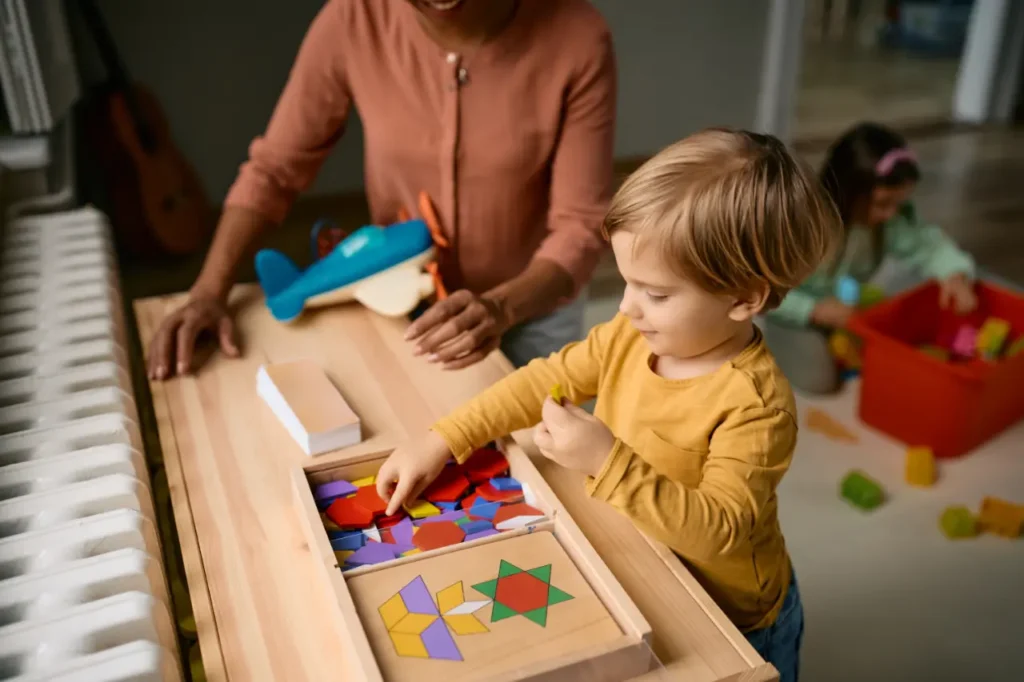The world of children’s toys is vast and varied. Yet, not all toys are created equal.
Enter Montessori toys. These unique playthings are designed with a purpose. They aim to stimulate a child’s senses, spark their curiosity, and encourage independent learning.
Montessori toys are more than just fun. They are tools for cognitive development, fostering skills that will serve children well beyond their early years.
In this article, we delve into the benefits of Montessori toys. We explore how they aid in learning through play, and why they are a valuable addition to any child’s environment.
Whether you’re a parent, an educator, or simply interested in child development, this guide will shed light on the unique advantages of Montessori toys.
Join us as we uncover the magic behind these educational treasures.
Understanding Montessori Toys and Their Unique Approach
Montessori toys are rooted in the Montessori method of education. This approach emphasizes self-directed activity, hands-on learning, and collaborative play.
These toys are designed to be simple and functional. They eliminate unnecessary distractions, allowing children to focus on the learning experience.
Montessori toys encourage children to explore and learn at their own pace. This fosters independence, a key aspect of the Montessori philosophy.
Often made from natural materials, Montessori toys are not only safer but also more environmentally friendly. They offer a tactile experience that plastic toys often can’t match.
In essence, Montessori toys are more than just playthings. They are carefully crafted educational tools designed to stimulate a child’s curiosity and facilitate their cognitive development.
Cognitive Development and Montessori Toys
Montessori toys play a crucial role in cognitive development. They challenge children with tasks that require problem-solving and critical thinking.
These toys are designed to engage a child’s mind. They encourage children to think, reason, and make connections between different concepts.
For instance, a simple wooden puzzle can teach a child about shapes and spatial relationships. It can also help them develop their problem-solving skills as they figure out where each piece fits.
Montessori toys also promote concentration and focus. Each toy provides a task with a clear beginning, middle, and end, helping children to stay engaged and complete the activity.
In essence, Montessori toys are cognitive development tools. They stimulate a child’s mind, fostering their intellectual growth in a fun and engaging way.
The Role of Natural Materials in Montessori Toys
Montessori toys are often made from natural materials. This is not just for aesthetic reasons, but also for the sensory experience they provide.
Wood, metal, and fabric are common materials used. These materials have different textures, weights, and temperatures, providing a rich sensory experience for children.
In addition, natural materials are safer and more environmentally friendly. They are free from harmful chemicals often found in plastic toys. This makes Montessori toys a healthier choice for children and the planet.
Fostering Independence and Concentration
Montessori toys are designed to foster independence in children. They encourage self-directed activity, allowing children to explore and learn at their own pace.
These toys also promote concentration and focus. Each toy provides a task with a clear beginning, middle, and end. This structure helps children stay engaged and focused on the task at hand.
Moreover, the self-correcting nature of many Montessori toys allows children to identify and correct their own mistakes. This not only boosts their problem-solving skills but also fosters a sense of independence and self-confidence.
Enhancing Fine Motor Skills and Sensory Development
Montessori toys play a crucial role in enhancing fine motor skills. Activities like lacing, buttoning, and using tools help children develop control over their small muscles. This control is essential for tasks like writing and tying shoelaces.
In addition to fine motor skills, Montessori toys also support sensory development. Many of these toys are designed to engage the senses, particularly touch. This sensory engagement helps children understand and explore the world around them.
Overall, Montessori toys provide a rich sensory experience. They help children develop a keen awareness of their environment, enhancing their learning experience.
Learning Through Play: The Montessori Way
The Montessori method strongly emphasizes learning through play. This approach allows children to explore and learn at their own pace. It fosters independence and encourages curiosity, making learning a fun and enjoyable process.
Montessori toys are designed to support this method. They are often open-ended, allowing for multiple ways of playing and learning. This flexibility encourages creativity and imagination, enhancing the child’s learning experience.
In conclusion, Montessori toys make learning an engaging and rewarding process. They help children develop a love for learning, setting the foundation for lifelong curiosity and exploration.
Montessori Toys and Language Development
Language development is a crucial aspect of a child’s growth. Montessori toys can play a significant role in this area. They often involve activities like naming, matching, and categorizing objects, which can enhance language skills.
For instance, picture cards and letter blocks can help children learn new words and understand their meanings. These toys can also aid in the development of phonetic awareness and reading skills.
In essence, Montessori toys provide a hands-on, interactive way to learn language. They make the process of acquiring language skills more engaging and enjoyable for children.
Preparing for School with Montessori Educational Toys
Montessori toys can be instrumental in preparing children for school. They teach foundational skills in a fun and engaging way, which can make the transition to formal education smoother.
These toys can help children understand mathematical concepts like counting, sorting, and spatial relationships. They also support the development of practical life skills, such as cooking, cleaning, and gardening.
In essence, Montessori toys provide a comprehensive learning experience. They equip children with the necessary skills and knowledge, making them ready for the challenges of school.
Conclusion: Integrating Montessori Toys into Your Child’s Life
Integrating Montessori toys into your child’s life can be a rewarding decision. These toys not only provide entertainment but also contribute significantly to a child’s development. They foster a love for learning, encourage creativity, and help children become independent thinkers.
Moreover, Montessori toys can be used in various settings, including homes, schools, and childcare centers. They are versatile and adaptable, meeting the needs of all learners.
In conclusion, Montessori toys offer numerous benefits. They are a valuable tool that can support your child’s growth and development, making learning an enjoyable and meaningful experience.


